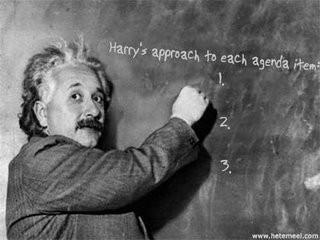Crash Course in Learning from Harry Potter
In an earlier post I said Kathy Sierra's Crash Course in Learning Theory was the best blog content of 2006. It outlined 18 principles for giving learners that "I Rule!" experience. Recently she pointed to an example of how to do this in under 1500 words!
"If you're interested in learning theory, teaching, legos, writing user docs, etc. -- you REALLY ought to read Harry Potter and the Trainer of Dire. There is much more there than might appear on the surface. And, well, anyone who tells a story in legos is already ten steps ahead of the game."
Go and read it now, and then let's see how much of Kathy's Learning Theory principles John used.
Ready, then? Okay.
First Principle: Get past the brain's crap filter. Did he do that?

But they used two different methods. Harry used an explicit method. He asked each participant why they were attending his session, and then constantly reminded them individually how the material related to their interests: Results-Oriented Learner Factilitation!
John, as an author, didn't have that option, so he had to employ other means. One was the novelty of his illustrations. Can you guess another?
Hint: What was the first line of the theme of the Beverly Hillbillies TV show? Metahint: The hint has nothing to do with Jed.
Second Principle: Learning is not a one-way "push" model

In addition to the "interactive exercises", Harry's follow-up questioning made the learners anchor their experience to their objectives.
John's interaction is all at the conclusion, but you'll notice that he does something he espouses in the story: he doesn't just ask you what the differences are between Harry's session and Snape's. He asks two other ROLF-oriented questions:
- Why do the differences matter? (What's In It For ME, the learner)
- What should you DO with this information? (Results-oriented)
Principle Three: Use visuals to improve (and speed up) understanding, retention, and recall

Yes, live monsters are effective visuals, but I think Kathy was going more for something like this:

Principle Four: Use redundancy to improve (and speed up) understanding, retention, and recall. Say the same thing, only "different"
Yes, well, this is where I was planning on discussing how Harry's disingenuous "custom" agenda was superior to Snape's carefully crafted curriculum, but in the spirit of the principle, I'm going to turn things over to a special guest commentator.
Take it away Albert!
Thank you. And before I forget, let me say that I'm still skeptical of this Spooky Action nonsense!
Professor Snape's training approach is the epitome of the conventional.
A list of compartmentalized topics. Very logical, but about as engaging your average academic paper. Of course, it's probably no coincidence that in both cases the author is passing along their accumulated wisdom and insight to the audience. Each author says "Follow my logic and you will learn as I have."
The learner's lutefisk.
In contrast, Harry's Results-Oriented Learner Facilitation covers the same material, but in a radically different way.
What's the first thing that comes to your mind when you look at this agenda?
What makes it inherently different than Snape's?
Need a hint? Go back to my intro picture.
This post's author is always droning on about "for most new IT applications, you don't get Dollar One of return on your investment until somebody's behavior changes...blah, blah, blah". For once I have to agree with him, and Harry's agenda is oriented around the same notion. ROLF isn't about transferring knowledge; it's about changing behaviors. Can you remember when you learned to snowboard? Ride a bike? Touch type? Were you able to do it well the first time you tried? The second? Changing behaviors - including thought patterns - requires practice. But I wasn't invited here to discuss brain science. Perhaps another day we can conduct a thought experiment and ride electrical impulses across synapses, but not today.
Back to Harry. The real power of the principal of redundancy can be found in how Harry approaches each of his individual topics. 
He follows the same three step approach to each one.
Can you identify each of the three steps?
No. I'm not giving you the answer. You need to change those thought patterns yourself! Goodbye.
Okay. Thanks, Dr. Einstein!
Principle Five: Use Conversational Language
Principle Six: Maintain interest with variety and surprise
A short list of additional two word phrases related to the topic:
- Crap Filter
- Time Turner
- Existing Opinions
- Sensory Preference
- Easter Egg
- ITIL Position
Principle Seven: Use mistakes, failures, and counterintuitive WFT?

This is the one where John really shines! In the first half of the story, we see Snape delivering a training course using all of the conventional techniques, from curriculum design to interaction models to student evaluation and reward (certificates!). Immediately afterward we see Dobby, a graduate of the class, fail miserably (saved only by the time turner!). We then see Dobby take Harry's course and then succeed admirably (or at least ethically).
Interestingly, after reading the story several times, I noticed a glaring error in Harry's training. Did you? Hint: Z.A. It's no wonder it took Dobby and his classmates so long to subdue their foes.
Principle Eight: Show, don't tell

This principle is the first thing you learn in screenwriter's school. Let story elements impart the information you want your audience to learn. John does this masterfully, imparting all the key elements of ROLF without telling us anything about it. As for Harry (and ROLF), it turns the old saying
"Tell 'em what you're going to tell 'em, tell 'em, then tell 'em what you told 'em"into
"Show 'em what you're going to show 'em, show 'em, then show 'em what you showed 'em!"
Principle Nine: Use chunking to reduce cognitive overload

Good question! What are they doing in this post?
Principle Ten: Since stress/anxiety can reduce focus and memory, do everything possible to make the learner feel relaxed and confident

I know what you're thinking: "HA! There's no way you can use the Zombie Attack to illustrate making learners feel relaxed and confident!" That's true. But I am going to use what Harry did before the Zombie Attack as a shining example of this principle. Let's face it. Every zombie attack is going to be a stressful situation (Sean of the Dead not withstanding). But as Einstein pointed out, Harry took a very measured approach to preparation for the big event. Do you remember what it was?
- Review Case Study
- Practice the Rijak on each other
- Lifecycle discussion
- All of the above
Principle Eleven: Use seduction, charm, mystery to build curiosity

Principle Twelve: Use a spiral experience model to keep users engaged. Use the game design concept of "next level".

Remember that "glaring" error in the story I mentioned before? Take a look at Harry's agenda. What is the first item? Defence against fast-moving undead at night. Do zombies appear on that list? But a did zombie appear during the practice section of that topic. Doh!

Even if the zombie was replaced with a werewolf (although I don't think there's a Lego for that), Harry's agenda violates Principle Twelve. He starts with the hardest level!
Principle Forty-one Charlie: Don't rob the user of the opportunity to think

One of the key reasons for the 'Show 'em...' model used in ROLF is that it forces learners to constantly be thinking. And in combination with principle four (redundancy), it's a very powerful behavior (thought pattern) changing tool.
Stories, too, are powerful tools for making people think. When you saw the first Harry Potter movie, did Hogwarts look exactly like you thought it would? See how much detail your mind filled in for you while you were reading?
Principle Fourteen: Use the 80/20 principle to reduce cognitive overload. Know what to leave out!

Harry omitted topics that Snape included. Do you remember which one(s)?
After having gone through 14 principles, I'm beginning to think I should have taken the 80/20 approach myself. If you could only choose four principles as the 20 that gives you the 80 in analyzing John's piece, which would they be?
- Get past the brain's crap filter
- Learning is not a one-way 'push' model
- Use visuals to improve (and speed up) understanding, retention, and recall
- Use redundancy to improve (and speed up) understanding, retention, and recall; say the same thing, only differently
- Use conversational language
- Maintain interest with variety and surprise
- Use mistakes, failures, and counterintuitive WTF?
- Show, don't tell
- Use 'chunking' to reduce congnitive overload
- Do everything possible to make the learner feel relaxed and confident
- Use seduction, charm, mystery to build curiosity
- Use a spiral experience model to keep users engaged. Use the concept of 'next level
- Don't rob the user of the opportunity to think
- Use the 80/20 principle to reduce cognitive overload. Know what to leave out
I cannot imagine a better example of this principle than John's story itself. While I'm sure there is much more to his Results-Oriented Learner Facilitation methodology (or he's just killed the goose that lays his golden eggs!), he manages to capture the key tenets and the learner benefits with a startling conservation of words! [Something you'll never find here!]
Professor Snape responds:
 "Those who do not learn from history are bound to repeat it! And can you really blame me if a house elf forgot what I taught him? I'm going to speak to my union representative about this!"
"Those who do not learn from history are bound to repeat it! And can you really blame me if a house elf forgot what I taught him? I'm going to speak to my union representative about this!"Principle Fifteen: Use emotions to increase attention and memory

And you thought I'd go with the Zombie Attack bit, didn't you?
Principle Sixteen: Use timing and pacing

The combination of the walkthrough-practice-review cycle and 'next level' agenda structure of Harry's training are the epitome of this principle.
Principle Seventeen: Never underestimate the power of fun

Principle Eighteen: It's all about your users!

I think little Jimmy got brain freeze out there in the snow. Can you unscramble his victory cry?
Remembering back to John's story, at the end of each session who was confident of the success of the class?
So there you have it! Nearly every one of Kathy's principles is demonstrated in John's 1400 word post. Wow! If only Harry had added a mnemonic device for remembering the order of things to do when confronted by undead. Then it would have been all 18!
Bravo, John!
posted by Mike at 12:00 PM 5 comments


